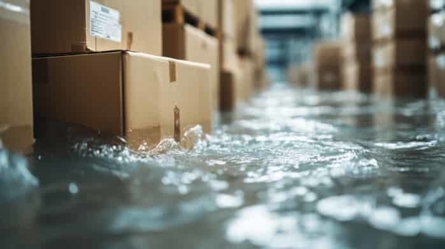West Michigan’s diverse climate presents unique challenges for commercial property owners. With lake effect snow averaging 75 inches annually and spring rainfall reaching 37 inches, businesses in Grandville and the surrounding areas are at a heightened risk for water damage. The city’s proximity to the Grand River and its rich industrial history further contribute to vulnerabilities, from aging infrastructure to fluctuating groundwater levels. Understanding the primary causes of commercial water damage can help Michigan business owners take proactive steps to protect their properties and avoid costly disruptions.
Understanding Michigan’s Commercial Water Damage Risk Factors
Environmental and geographical factors specific to West Michigan significantly impact commercial properties' vulnerability to water damage. Recognizing these regional risks allows business owners to implement targeted preventive measures.
Lake Effect Precipitation Patterns - Heavy snowfall from lake effect storms can lead to roof collapses, ice dams, and excessive moisture buildup that weakens building structures over time.
Freeze-Thaw Cycles and Plumbing Systems - Michigan’s harsh winters subject plumbing systems to repeated freezing and thawing, increasing the risk of burst pipes and interior flooding.
Grand River Flooding - Fluctuating groundwater levels and seasonal flooding pose a threat to commercial properties, particularly those in low-lying areas near the river.
Primary Sources of Water Damage in Commercial Buildings
The most common causes of water damage in Michigan commercial properties stem from both internal systems and external environmental factors. Seasonal weather patterns often exacerbate these issues, making regular maintenance crucial.
Plumbing System Failures - Older industrial buildings along Chicago Drive often feature outdated plumbing, making them more susceptible to leaks, pipe bursts, and sewer backups.
HVAC System Condensation - During humid summer months, commercial HVAC systems generate condensation that can accumulate and cause water damage if not properly drained.
Roof Damage from Snow Load and Ice Dams - Heavy snowfall can cause structural stress on commercial roofs, while ice dams prevent proper drainage, leading to leaks and interior damage.
Foundation Seepage - Buildings near the Wilson Avenue watershed are prone to foundation leaks due to rising groundwater levels and poor drainage infrastructure.
Industry-Specific Water Damage Risks
Different industries face unique water damage challenges based on their operations and facility requirements. Recognizing these risks allows businesses to implement specialized preventive measures.
Manufacturing Facilities - Properties along Industrial Drive often contain extensive piping and machinery that, if compromised, can lead to major water damage incidents.
Retail Spaces - Shopping centers in the Rivertown Crossings area are vulnerable to roof leaks, plumbing failures, and damage from customer traffic bringing in moisture from rain and snow.
Warehouses and Storage Facilities - Large, open spaces often have minimal heating, increasing the risk of frozen pipes and condensation-related issues.
Office Buildings and Medical Facilities - Water damage in these settings can lead to significant disruptions, equipment damage, and health concerns due to mold growth.
Hidden Water Damage Sources in Commercial Properties
Many water damage incidents begin as small, unnoticed issues that escalate over time. Early detection is key to avoiding costly repairs.
Concealed Plumbing Problems - Leaks behind walls, above ceilings, or in utility chases can go unnoticed for long periods, leading to mold growth and structural damage.
Deterioration of Windows and Doors - Michigan’s freeze-thaw cycles cause sealant degradation, allowing water infiltration that weakens building integrity.
Drainage System Weaknesses - Flat commercial roofs often suffer from poor drainage, leading to standing water and eventual leaks.
Condensation Issues in Mechanical Rooms and Server Spaces - Excess moisture can damage electrical components and create hazardous conditions in commercial buildings.
Impact of Seasonal Weather Patterns
Each season in Michigan presents distinct water damage threats. Business owners should be aware of these seasonal risks and take appropriate precautions.
Winter Risks - Frozen pipes, ice dams, and snow accumulation threaten roofs and plumbing systems.
Spring Flooding - Melting snow and heavy rains increase the risk of groundwater intrusion and drainage system overload.
Summer Humidity and Storms - High humidity levels contribute to condensation issues, while severe storms can cause roof leaks and structural damage.
Fall Maintenance Priorities - Clearing gutters, sealing windows, and inspecting plumbing systems can help prepare properties for the winter season.
Prevention Strategies and Best Practices
Implementing a comprehensive water damage prevention strategy is essential for Michigan business owners looking to protect their properties year-round.
Seasonal Maintenance Schedules - Regular inspections of roofing, plumbing, and HVAC systems can help detect vulnerabilities before they become major problems.
Leak Detection Systems - Installing smart sensors and monitoring systems can provide early warnings for leaks and moisture buildup.
Emergency Response Planning - Developing a clear action plan for water incidents ensures quick mitigation and minimizes damage.
Staff Training - Educating employees on signs of water damage and response procedures helps reduce risk and response time.
Commercial Insurance Considerations
Understanding water damage insurance coverage is crucial for business owners to ensure they have adequate protection against financial losses.
Typical Coverage - Policies often differentiate between sudden water damage events (covered) and gradual damage from neglect (not covered).
Documentation Requirements - Maintaining records of maintenance, inspections, and water damage incidents is essential for successful claims.
Impact of Preventive Measures - Insurers may offer premium discounts for businesses that implement leak detection systems and proactive maintenance plans.
Water damage can cause significant disruptions to Michigan businesses, but proactive prevention and a strong emergency response plan can minimize risks. ServiceMaster Restoration by the Disaster Response Experts specializes in helping Grandville business owners mitigate and recover from water damage incidents. With extensive experience handling West Michigan’s unique climate challenges, our team offers 24/7 emergency response, expert restoration services, and tailored solutions to keep your business operational. Don’t wait until water damage impacts your commercial property. Contact ServiceMaster Restoration by the Disaster Response Experts today to develop a proactive water damage prevention strategy and ensure your business is prepared for any emergency.



